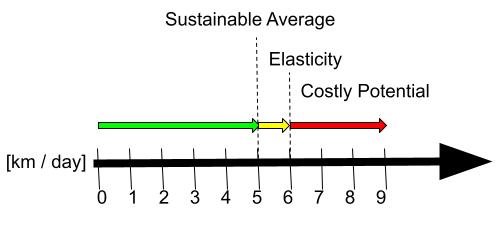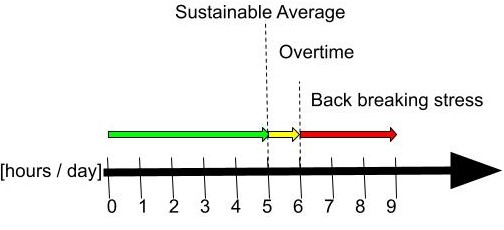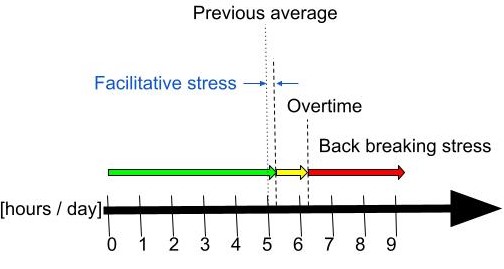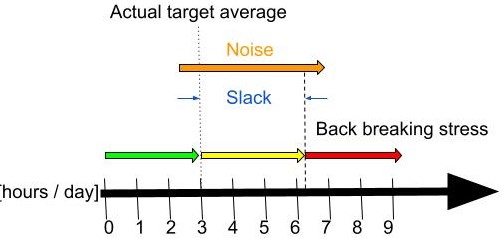This post is inspired by [Aiming for the minimum of self-care is dangerous] written by the EA forum user tessa. I felt very seen. With this post I attempt to add to its ideas. I recommend you read tessa’s post first but I don't think it is necessary to understand what I am exploring here.
Summary: This post describes a few of my thoughts around effort, optimization and obligation. It starts with a simple runner analogy that introduces the concept of facilitative stress. Then I share some personal considerations and anecdotes. I expect most value to be in the chapter “Problems that arise when you aim at the facilitative stress zone”.
After drafting this post I have checked and found that Lynette Bye has actually done research and has written about very adjacent ideas here and here. At the end of the post I have included a list of more relevant readings.
Disclaimer: I am no expert on mental health. These are not recommendations. I expect my thinking about this topic to change over time. Additionally, things I describe here might not relate to you at all.
Analogy of a runner
Consider a hypothetical me, that is in relatively good shape and who can run 5 km every day.
One day I think: hey, maybe I can achieve more. I will now start running 7 km every day.
And it works. The next day and the day after that I run 7 km. But on the third day I feel tired and exhausted. My body sends me signals of distress or fatigue, such as muscle pain, problems while breathing etc.
So I realize I probably pushed myself a bit too far and I decide to run just my usual 5 km today. Because I can totally do them - right? I am running and I am struggling already at km 2. I manage km 3 and have to really push myself. At km 4 I run out of energy. I stop.
I am dumbfounded. What is happening? Usually I can always do 5 km. Why not today? And I start reflecting on what kind of signals I have been getting from my body. And I realize that on day 2 of running 7 km there were already some of the signals (muscle pains and challenges while breathing) but I just ignored them.
I start tracking my distances and signals. I am careful and systematic this time. So after a rest day and being back to 5km a day I start increasing the distance in 0.5 km increments and I intensely monitor my body for signals. And after 2-3 weeks of experimentation I find out that I am actually a 5 km runner on average. For every day that I run, say, 6 km I will have to run 4 km the next day if I want to do 5 km again the day after that. This is a sustainable level of effort for me.
I also discover that if I run 7 km in one day (which I am capable of!) my total average over the week actually decreases! This is because when I push myself to run 7 km in one day, I need more rest to recover than I do on days where I stick closer to my daily average of 5 km. This extra rest is enough that the total distance (productivity) decreases. I have extra potential that comes at a cost. Good to know. An important data point!
There seems to be an elastic range above my average that doesn't affect my total weekly kms (35 km total (7 days x 5 km per day)) as long as I include the elasticity in my planning over the next few days. Say, if I go 6 km on day 1, I can do 4.5 km and 4.5 km on day 2 and 3.
Sustainable Effort Diagram

Breaking up the analogy
By “daily distance” I mean anything that requires effort. That is, not just your day job but also other energy drains in your free time, such as researching, coding, active networking, cooking, doing taxes, cleaning your house, maintaining relationships, learning, studying etc. I know certain tasks are way harder and cost more energy and some tasks are super easy, barely an inconvenience. Some tasks are more like running up a slope and others are slightly downhill with a fresh breeze in the back.
I want to stress here: Time is not a good metric for measuring performance! This is a topic for another conversation. But given that time is a limited resource (as is the amount you can work on any given day) we will use it here as a unit.
And the signals you get from your body when you’re exceeding your level of sustainable effort are not muscle pains (unless you do heavy physical work, which is a minority in the EA communities), but signs of declining mental health, such as depression, fatigue, insomnia, tension headaches, reduced motivation and even suicidal thoughts like those mentioned in this post.
So our diagram from earlier might look more like this in a typical work environment:
Sustainable Work Diagram

Similar to your personal life, you might face additional workload from time to time, for example, end of year sprints. I know a lot of EA organizations experience Giving Season stress (during the weeks leading up to Giving Tuesday) as they are rushing to publish their latest ideas and project proposals. And people tend to push themselves (and maybe their teams) more to polish their reports and put some extra work in. And most people will get (some of) their needed rest from the 'Overtime' during the holiday period at the end of the year.
I don't want to say you should never tap into your costly potential. There will be times where even "Back breaking stress"-levels are the reasonable thing to do. Say, you are working on something extremely urgent or you have to finish your thesis on a tight deadline (that is, if the final grade actually matters to your career). However, if you do such a sprint, it is good if you can plan something like a week off after your deadline to recover (and take care of all the things you most likely had to drop in the meanwhile).
I want to go back to the runner analog to introduce a distinction in the stress levels: "facilitative stress".
Becoming a better runner
You are a runner again. You got valuable data points. You keep track of your data points. You are still curious about your potential. You want to get better because you value something about it. You start with a small increase and test running 5.2 km. Your weekly average has increased by 1.4 km. And you realize you can sustain this over several weeks. You wonder if there will be upcoming weeks where your average will drop below your previous 35 km total. It does indeed drop. But not by as much. You discover you can run 35.7 km per week, or 5.1 km per day. You now have a new average - Congratulations!
You start testing with wider variations again. And yes - indeed - you have accomplished a new average. The slight additional effort/stress over your average has increased your actual capacity. I want to call this facilitative stress (distinct from debilitative stress). The graph now looks like this:
Improved Work Diagram

Facilitative Stress and Obligation
These are the basics for people who want to exercise. You know you need rest days for your muscles to recover and people know you can destroy your gains if you do excessive exercise.
People who spend time thinking about productivity, efficiency, and optimizing are well aware of the gains you get in the long run from small incremental improvements to your habits, striving to be a tiny bit better than you were yesterday. Who knows what you might be capable of 2 years from now!
This is why I feel a strong pressure to always stay in the facilitative stress zone. Who knows what I might be able to contribute to the world a decade from now if I improve my knowledge, my relationships, and other capacities, becoming more resilient in the process. Failing to explore my limits seems like a big missed opportunity. I would go so far as to say that I have an obligation to push myself. An obligation to strive to be the person who improves and updates (#scoutmindset). I am aware this sounds a lot like motivational-self-help woo. And I could see myself updating towards basic life wisdoms, such as, ‘well just live a decent life’, the older I get.

It is just that I see a vast potential of personal astronomical waste if I don’t improve. Staying with the previous metaphor: If the overall distance I walk is my desired outcome and I walk at a steady pace I can achieve a fixed amount over my career. But if I am able to accelerate my pace by 1% every time/distance interval X, then the overall distance I can cover follows an exponential curve. Soon I will get a lead to my alternative self that is not improving. And quickly after that I will be running laps around stagnant-me.
Obviously there will be limitations. Certain aspects of life can only be optimised in an s-curve way before diminishing returns kick-in. So you max-out after a few months or a year of exploring. But I also think we will never run out of things to learn given the short lifespans we have right now. If I am lucky I might have like half a century (for my career) in front of me (in which so many transformations and disruptions will take place that planning for such a long time seems senseless).
I think the idea of continued improvements and accelerations is a dangerous meme. It is unrealistic and on its own it will set you up for failure. However, I also think that the counterfactual of becoming and being ambitious can be great. So it needs to be combined with counter-memes, safety nets, emergency brakes, and careful planning.
80k frequently mentions that people tend to have significant impact towards the end of their career (see Career Capital and Three Career Stages). Assuming this baseline career advice holds true and I don't have a strong reason to think my contributions in the next year will outweigh more slowly consistent contributions over the next 5 years, then it means that it is immensely important that I find a rhythm that works for me for decades. To quote the cliché again "it's a marathon - not a sprint" (or maybe even a hike).
3 brief personal anecdotes
1) School was not really challenging for me. Back then I was low in ambition and didn't care about grades. So when I entered university I was probably capable of doing 0.5 hours per day on average. So the first years I had to actually learn how to learn first, before I could even think about finishing a degree anytime in the not too distant future.
2) Last year I did a few over 100 hour work weeks during my stay at the EA hotel (CEEALAR) which was a very supportive environment (barely any time spent on household chores, convenient access to everything I needed, and supportive people). And everytime I did such a one week-long sprint I took one full week off, which surprisingly worked well for me. I don’t aim to do this anytime soon though, because it messed with my sleep cycle and a decent routine is valuable. But it is good to know that I can pull (something like) this off if needed.
3) Recently I probably was quite close to a breakdown as described by the post mentioned previously. I have significantly reduced my work hours and included more time for energy giving activities (for example learning to play drums). So nowadays I feel quite confident that my sustainable average is around 2-3 hours per day of actual work. To convert "actual work" to "time spent in an office" simply double the amount. And I aim to slowly climb again. Which brings us to the problem of a moving target as described by [tessa].
Problems that arise when you are aiming at the facilitative stress zone:
- You probably don't know (yet) where your actual sustainable average is. I expect this to be especially true for people early in their career or in new work environments. If you do know what you are capable of - awesome!
- Time is a bad metric. It can be useful but it has its limits. For example, on my best days I can work 5 hours on a cognitively challenging problem. After that there is no more brain juice left. I still can do my laundry, clean the house, and answer some basic emails. But I can't read something intellectual. These are the days in which you switch from reading a chapter of "From AI to Zombies" before you sleep to a chapter from HPMoR - or let’s be honest you engage in a senseless Facebook/YouTube spiral.
- You are most likely not a mindfulness expert and therefore you can’t fine tune your effort- or stress-levels. It will rather be a strong oscillation. You will overshoot and you will suffer or your body will take the rest it will need. You will undershoot and feel guilty when you realize that you could have had more of the thing you care about [examples of things you could care about: contribute and have an impact in the world - putting effort into your relationships - preparing some special dish that might be healthier than convenience food].
- I expect undershooting to be a rare occasion within the EA community. To quote tessa: “Some people seem to naturally have guardrails around this sort of thinking; they notice when they’re putting too much pressure on themselves and ease off. It’s not surprising that the effective altruism community, which selects for a willingness to make unusually large ethical commitments, attracts people who lack these guardrails.”
- And what might feel like undershooting might actually just be some slack in your life and the high-variance of life was kind to you for a brief period. Given the high-variance of life you should expect to come across periods of low commitments and relative ease. I claim that a zero amount of ease is a sign of bad optimization. Similar to how you expect to miss trains or flights non-zero amount of times (tl_dr: because you don’t want to waste time waiting at airports all your life).
- Life is messy and noise (in measurements) is everywhere (see ‘Noise - A Flaw in Human judgement’ by Daniel Kahnemann). Your capacity is influenced by many different factors. Among the strongest ones probably being your sleep and the relationships you have to people close to you (colleagues, flatmates, significant others). And then you have health, illness, covid-scares when your contract tracing app turns red, and seasonal energy changes (e.g people experiencing SAD / winter depressions).
- You can rationalize to always push yourself because "hey, it might be facilitative".
- If you already have some fixed responsibilities in life, for example raising a child, you might not have the luxury to experiment because you can not afford the recovery times that come with testing your limits.
- While pushing your capacities you will run low on slack. This will prevent you from picking up opportunities such as spontaneous collaborations. You won’t have the time to explore a random idea you found online. Or you might work out some ideas and find insights but you don’t find the time to put them into clear words (for yourself and maybe for sharing with your friends and perhaps finally the internet).
So our previous visualisation might look more like this:

Notice how the anticipated variance in Life can lead to days that require even lower effort levels, than you are comfortable with contributing consistently. And yeah the opposite is true as well. If you realise that your background noise of suicidal thoughts is increasing, then you are definitely in the red-zone and the fact that you have such a background noise means you have been there for quite a while (even though the underlying reasons might be seperate from your stress/effort levels).
So what do I do?
- So I aim to reflect more about how I feel. I want to notice signs of distress early enough to adjust course in time. I have set up a weekly, monthly, and quarterly reflection routine for me to notice my energy and stress levels. I have combined this with an accountability buddy to make sure I stick to it.
- I pay attention to sleeping better (which sometimes means more).
- I deliberately take like 10 minutes a day to meditate. This might help me calibrate myself in regards to my own well being.
- I am considering experimenting more with my time. See: “Self-experiment: Does working more hours increase my output?” by Lynette Bye
- I remind myself that it is easy to overshoot, even if you carefully set your goals. I currently aim for 80-90% instead of 100%.
Recommended readings:
- Useful things that I have found in the LW/rationality sphere: Self-Compassion, Noticing Confusion, Anger as evidence, Effective Rest Days - Logan
- How long can people usefully work? Lynette Bye Coaching
- Burnout - What it is and how to treat it.
Acknowledgements:
- Thanks to Sonia for sharing the distinction between debilitative and facilitative stress.
- Thanks to the early readers who left extremely helpful comments and added useful resources (Carolin, FJehn, Teis, Juan). Anything wrong in the text above and opinions uttered are obviously my fault.
Ps.: This is kinda my first time ever writing down a blogpost in which I share my thoughts about something that is not research. And I know there are aspects I could have explored more (e.g. slack and burn-out) but I have decided against doing that in favor of publishing as is. So feedback is appreciated.




Awesome! Thanks for the comprehensive reply. I'm in the midst of writing of first Forum post right now, and this is super helpful.